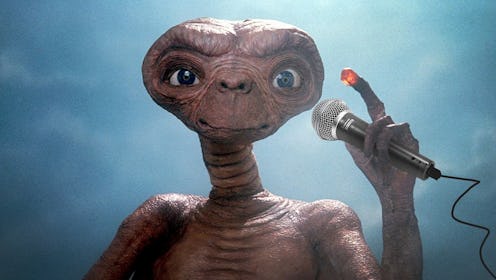Life
This Expert's Theory On Why Aliens Haven't Contacted Us Yet Will Chill You To The Bone

If you’ve ever wondered why we haven’t met space aliens yet here on Earth, congratulations — you’ve been asking yourself the exact same question posed by a concept called the Fermi Paradox. According to one scientist’s theory, however, the answer could be a lot darker than many of us might think. Proposed in a pre-print, not-yet-peer-reviewed paper by Alexander Berezin, a Russian physicist from the National Research university of Electronic Technology (MIET), the “First in, last out” solution fills me with some truly next-level cosmic existential dread — the kind that’s so big, I didn’t even realize I was capable of feeling it.
Named for Enrico Fermi, the Italian physicist and Nobel prize winner who created the world’s first nuclear reactor, the Fermi paradox seeks to explain why we haven’t encountered extraterrestrial life yet — the point being that, given what Berezin calls “commonplace assumptions about galactic civilization formation and expansion,” it should have happened by now. Physicist Michael H. Hart, who wasn’t exactly Fermi’s contemporary, but was around during his time (Fermi was born in 1901 and died in 1954, while Hart was born in 1932 and is still alive today), laid out the four most widely accepted possible answers to the problem in 1975:
- “Physical explanations”: Aliens haven’t able to make the trip due to any of a number of reasons, including astronomy-related issues, biology-related ones, and engineering-related ones;
- “Sociological explanations”: Aliens have simply chosen not to come to Earth;
- “Temporal explanations”: Advanced civilizations have risen too recently for Aliens to have had the time to make it to Earth yet;
- And lastly, an idea with the heading, “Perhaps they have come”: Aliens have already been to Earth, but we’ve failed to notice them and they aren’t currently present.
The reason the paradox is named for Fermi is because it’s got a sort of anecdotal origin story. According to accounts of a lunch that occurred in 1950 at Los Alamos — the birthplace of the atomic bomb and currently a government research facility — Fermi asked, during a conversation about a New Yorker cartoon featuring aliens collecting New York City trash cans, “Where is everybody?” He meant, where are the aliens?; and from there, the conversation turned to interstellar flight and whether or not it was feasible. According to Herbert York, whose memory of the event was collected by physicist Eric Jones, Fermi “went on to conclude that the reason that we hadn’t been visited might be that interstellar flight is impossible, or, if it is possible, always judged to be not worth the effort, or technological civilization doesn’t last long enough for it to happen.”
But what if Hart’s explanations are all incorrect? In the early '80s, Frank Tipler proposed a fifth solution: If, said, Tipler, extraterrestrial life didn’t actually exist — that humans are the only intelligent life in the universe — then boom, the paradox is solved. That’s also where Berezin’s paper comes in, with his solution building off of Tipler’s. Berezin calls the solution the “First in, last out” solution — and it’s predicated on an absolutely chilling thought: “What if the first life that reaches interstellar travel capability necessarily eradicates all competition to fuel its own expansion?”
Berezin notes that he’s not saying that a “highly developed civilization would consciously wipe out other lifeforms” — that is, that, once someone, somewhere develops interstellar travel, that civilization will then go on a rampaging conquest to take over the galaxy and flatten everything in its wake; the destruction will likely be incidental, with whichever civilization gets destroyed being so small as to barely register on the destroyer’s radar. At most, it would be a Hitchhiker’s Guide to the Galaxy situation, where the Vogons destroy the Earth to build an intergalactic superhighway; more likely, however, Berezin writes, “they simply won’t notice.” He uses a similar construction metaphor, but… uh… worse: If the Earth is like an inopportunely placed building to the Vogons, in Berezin’s metaphor, the earth is an “anthill” the construction crew destroys in order to put up a building “because they lack the incentive to protect it.”
Raise your hand if you feel reeeeeeeally small right now.
But wait! There’s more! And this is where it starts to get even scarier, too. Berezin’s theory takes Tipler's to the next level: That is, we — the humans of planet Earth — are the first to arrive (that is, the first to develop interstellar travel), and will likely be the last to leave… meaning that we’re the ones who are going to (perhaps unwittingly) destroy everyone else. That, uh, gets rid of the “small” feeling I was just talking about… but I don’t really feel much better about it. Berezin points out that he really hopes he’s wrong; however, he’s right: The possibility is there.
And that’s all kinds of frightening.
Of course, there’s also this: As Robert H. Gray pointed out at Scientific American in 2016, the Fermi paradox has been criticized for being neither Fermi’s, nor a paradox. First, we don’t have any writings directly from Fermi about it; all we have are the memories of other people concerning something he seems to have said at some point. And second, as Gray put it, “nobody thought [Fermi] was questioning the possible existence of extraterrestrial civilizations”; generally, it was understood that he was questioning whether interstellar travel was possible. Since the paradox does question the existence of extraterrestrial life, however, associating it with Fermi, said Gray, “misrepresents Fermi’s views.”
But whether or not Feri actually has anything to do with it almost doesn’t matter in the long run — because the question still remains: Where is everybody?
Have they destroyed everyone else?
Or… are we ourselves about to become the destroyers?